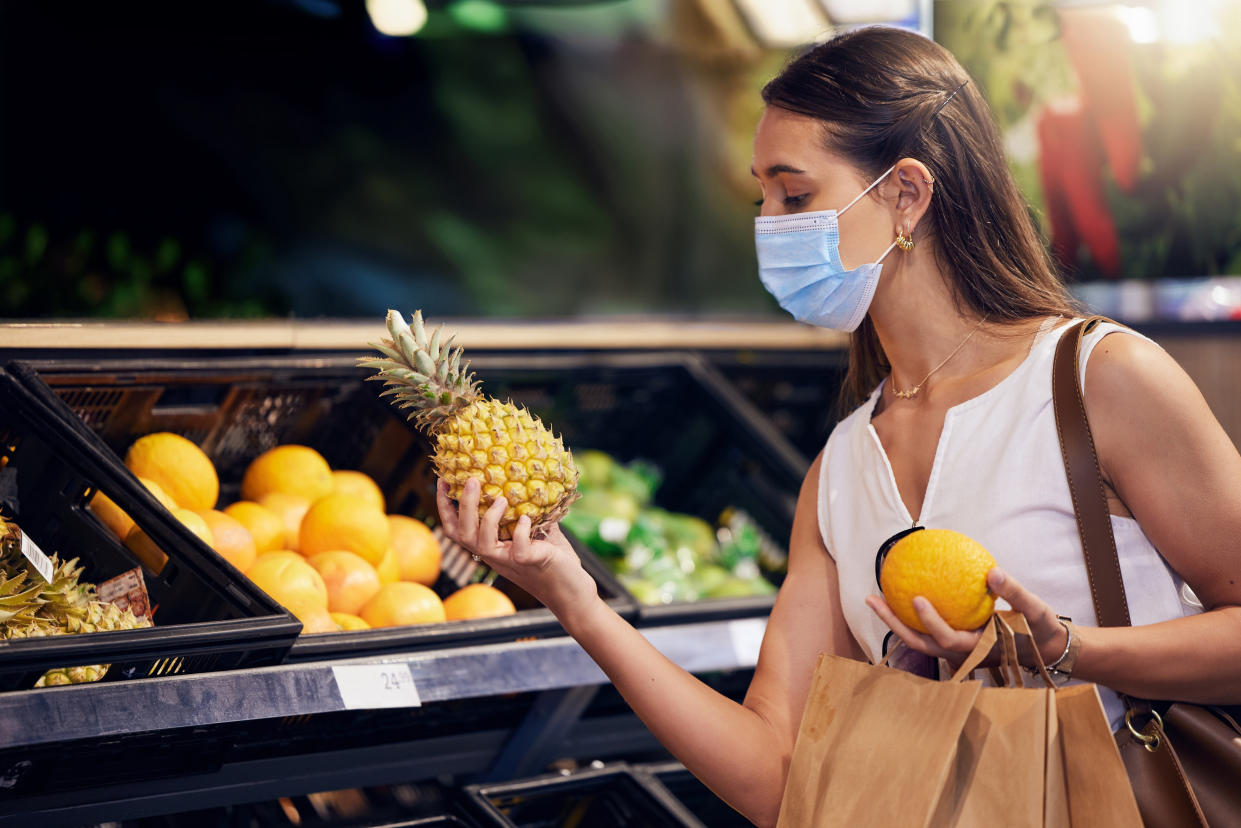The summer COVID wave is here. Should you mask up?

There has been a summer COVID-19 wave ever since the pandemic began — and this season is no exception. Emergency room visits due to the coronavirus are up more than 18% compared to the previous week and hospitalizations are up more than 13%, according to data from the Centers for Disease Control and Prevention.
Before the summer surge, activity around the virus had been fairly quiet for months, and many Americans — nearly 60%, according to one Gallup poll — view the pandemic as over. So where does that leave you in terms of COVID-19 prevention? For the record, masks are still recommended to help lower your risk of getting COVID. And given the recent uptick in COVID-19 cases, masking questions are surfacing right now. Here’s what doctors recommend keeping in mind.
When should you mask these days?
Doctors agree that it’s tough to make blanket statements about this, given that everyone’s personal health situation and risk tolerance is different. But for most people, masking up in crowded indoor situations when COVID-19 levels are high in your area and you’re concerned about getting sick is recommended, Dr. William Schaffner, an infectious disease specialist and professor at Vanderbilt University School of Medicine, tells Yahoo Life.
It’s also a good idea to wear a mask if you’re having upper respiratory symptoms like a cough, congestion and runny nose and need to be around others, Dr. Barbara Bawer, a family medicine physician at the Ohio State University Wexner Medical Center, tells Yahoo Life. “Whenever you’re feeling unwell, just from an abundance of caution, you should mask,” she says.
But if you’re feeling OK, you may just want to mask up in places like your local grocery store or retail shops if COVID cases are high in your area and you want to stay healthy, Schaffner says. It’s also a good idea to wear a face mask at the doctor’s office.
That said, Schaffner says masking outside usually isn’t necessary. “Even I, who am very cautious, don’t put on a mask when I’m outdoors,” he says.
Who should mask?
People who are at greater risk of a more serious outcome from COVID-19 infection — the elderly, people who are pregnant, patients with a compromised immune system, or those with other underlying health conditions, such as heart disease or diabetes — should consider masking, says Dr. Alan Lesse, associate professor of medicine and vice chair for education at the Jacobs School of Medicine and Biomedical Sciences at the University at Buffalo. “The advantage of masking is that it will decrease the risk of transmission of many respiratory viruses and bacteria in addition to COVID-19,” he tells Yahoo Life.
In general, if you want to wear a mask, doctors say you should do just that. “I currently recommend a mask for anyone who feels more comfortable wearing one,” says Lesse.
Is it OK to use that mask that’s been hanging out in your bag for a year?
It’s easy to toss a mask in your bag and then forget all about it, only to rediscover it months later. But in general, doctors aren’t fans of putting that mask over your face. “Masks that have been sitting around are likely to be ragged and not performing optimally,” Schaffner says.
Bawer points out that the mask has likely “picked up all kinds of allergens and dirt from the bag.” If you’ve already worn the mask, “it may also have viruses and bacteria attached to it from when you wore it the first time,” she says.
Something else to consider, per Lesse: If something in your bag has been damp or wet, like a water bottle, and has come into contact with your mask, you should replace the mask. “Masks that are stored in moist environments will lose their protective capacity,” he says.
If the mask is in an unopened package, hasn’t been used and seems to be in good condition, Bawer says you’re likely fine to go ahead and use it.
Do masks ever expire?
Masks are usually good for about three to five years after they’re manufactured, Bawer says. “But even after this time, they are still more effective than no mask at all or a mask that is being reused,” she says. Most masks that come in a package will have the expiration date on the label, she adds.
Lesse notes that N95 and KN95 masks used to be considered one-time-use devices when they were used by health care staff. But with the pandemic and mask shortages, people started reusing them. “In the hospital, their use has returned to single-use,” he says. But, he points out, most people outside medical settings use the masks more than once.
When should you get a new mask?
If you want to use masks the way medical staff do, technically you should get a new mask after every use. But even doctors say that really isn’t necessary if your mask still fits well and looks like it’s in good condition.
“If the mask becomes moist or damaged, or the fit becomes loose, the mask should be replaced,” Lesse says. But if you’ve used a mask and it still looks OK, he says reusing it should be just fine.


